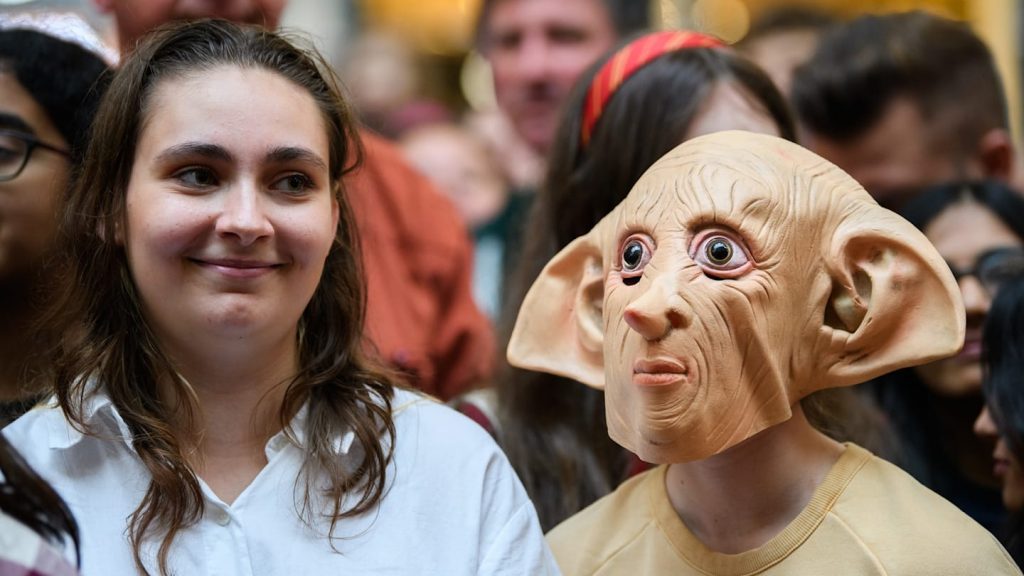The Harry Potter series is filled with numerous characters, ranging from ordinary-named witches and wizards like Dean Thomas to uniquely named Muggles like Arabella Figg. Keeping track of the various characters and their actions can be particularly difficult, especially in the film adaptations where some characters’ roles have been adjusted or combined to fit the narrative better. There are five characters from the books who did not make it into the films.
Alice Longbottom: In the book, it remains unclear why Neville was brought to King’s Cross by his grandmother, or why she sends him forgotten items. It is revealed in “Harry Potter and the Goblet of Fire” that Neville’s parents were driven to madness and no longer recognize him. His mother, Alice, does reach out to him in a poignant moment during “Harry Potter’s Christmas in the Closed Ward.” However, these interactions are excluded from the films.
Merope Gaunt: In “Harry Potter and the Half-Blood Prince,” Merope, the mother of Tom Riddle, is absent from the film’s flashbacks, limiting our understanding of her backstory. The film portrays some key events involving her family, which further illuminates Tom’s lineage and the love potion that led her to marry Tom Riddle.
Marietta Edgecombe: Marietta is introduced in connection with Cho Chang, who is a prominent character in the films, particularly during the Triwizard Tournament. While Cho is depicted grieving her boyfriend Cedric Diggory, Marietta’s storyline involving betrayals under the influence of Veritaserum and the repercussions she faces (including a visible curse) are omitted from the movie adaptations.
Winky: Winky’s story, introduced in “Harry Potter and the Goblet of Fire,” is a heartbreaking one. She is unjustly blamed for a spell gone wrong and, despite a complex history involving loyalty to her master and a deep sense of despair, her character is significantly diminished in the films.
Phineas Nigellus Black: Known as Hogwarts’ least popular headmaster, Phineas has a knack for belittling others and often provides commentary from his portrait. His role could have added depth to the narrative, especially in relation to key events in the final book. His absence in the films leaves a gap in the storytelling around the history of the Black family and their connection to the Order of the Phoenix.
The Gaunt Family: The Gaunt family, Descendants of Salazar Slytherin, was central to understanding Voldemort’s origins. Merope Gaunt, his mother, used a love potion to marry Tom Riddle Sr. but was abandoned after the spell wore off. Her brother Morfin and father Marvolo represented the decay of blood purity. The exclusion of this subplot in The Half-Blood Prince weakened the exploration of Voldemort’s trauma and thirst for power.
Andromeda and Ted Tonks: Andromeda Tonks, sister of Bellatrix and Narcissa, was disowned by her family for marrying Ted, a Muggle-born. In the books, they sheltered Harry during the escape in The Deathly Hallows, and Ted was killed by Death Eaters. Their exclusion erased the complexity of family dynamics and resistance against prejudice in the wizarding world.
Peeves: The poltergeist of Hogwarts, was a chaotic entity who caused mischief by breaking objects and mocking students and staff. His absence in the films was notable, as he represented the anarchic spirit of the castle. In the books, he played key roles, such as helping Dumbledore locate the Fat Lady in The Prisoner of Azkaban and distracting Death Eaters during the Battle of Hogwarts. Interestingly, actor Rik Mayall was cast as Peeves in The Philosopher’s Stone, but his scenes were cut.
Ludo Bagman: A former Quidditch player and head of the Department of Magical Games and Sports, Bagman organized the Quidditch World Cup and the Triwizard Tournament. His gambling addiction led him to owe gold to goblins and attempt to manipulate Harry to win a bet. In the films, his role was absorbed by Barty Crouch Sr., losing the complexity of his moral downfall and his impact on the Weasley twins, who pursued him to collect their debt.
Charlie Weasley: The second son of Arthur and Molly, Charlie was a dragon expert in Romania. In the books, he helped transport Norbert(a), Hagrid’s dragon, in The Philosopher’s Stone and provided creatures for the Triwizard Tournament. His absence in the films reduced the representation of the Weasley family, erasing his role as one of the most independent and courageous brothers.
Hepzibah Smith: An eccentric collector and descendant of Helga Hufflepuff, Hepzibah owned the cup that became one of Voldemort’s Horcruxes. He murdered her and framed her house-elf, Hokey, to cover his crime. Her absence in The Half-Blood Prince weakened the explanation of Voldemort’s obsession with relics of Hogwarts’ founders.
Ted Lupin: The son of Remus Lupin and Nymphadora Tonks, Ted inherited his mother’s Metamorphmagus abilities and was Harry’s godson. Although an actor was cast for the epilogue of The Deathly Hallows, his scene was cut. His absence erased a symbol of post-war hope and the continuity of generations.
The Muggle Prime Minister: In The Half-Blood Prince, the Muggle Prime Minister is visited by the Minister of Magic, Cornelius Fudge, who explains the magical events affecting the non-wizarding world. This scene, cut from the film, highlighted the interaction between the two governments and the impact of Voldemort’s return beyond Hogwarts.
Bertha Jorkins: Was a Ministry of Magic employee who disappeared during a trip to Albania. In the books, it is revealed that she was captured by Voldemort, who extracted crucial information from her memories about the Triwizard Tournament and Barty Crouch Jr. Her death played a pivotal role in Voldemort’s return to power. However, she was completely omitted from the films, which diminished the depth of the plot surrounding Voldemort’s resurgence and the manipulation of events leading up to the Triwizard Tournament

